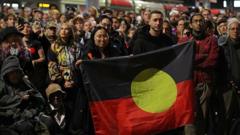The death of Cassius Turvey, an Aboriginal boy who succumbed to severe head injuries after a violent assault in Perth, has shocked the nation and prompted widespread protests. Justice Peter Quinlan condemned the deeds of Jack Brearley and Brodie Palmer, who were described as "callous" in a recent court sentencing. They fatally attacked Turvey using a metal pole, while a third accomplice received a lesser sentence. The tragic event emphasizes ongoing racial tensions within Australia, reigniting the national discourse on the treatment of Indigenous communities.
Two Men Sentenced to Life for Murder of Aboriginal Teenager Cassius Turvey

Two Men Sentenced to Life for Murder of Aboriginal Teenager Cassius Turvey
A brutal assault that led to the death of a 15-year-old has once again ignited discussions on racism in Australia, with two men receiving life sentences for murder.
Cassius Turvey, just 15 years old, was brutally assaulted last October on the outskirts of Perth and tragically passed away ten days later from severe head injuries. The brutal attack not only shocked his family and community but also triggered widespread protests and vigils around the country, igniting fierce debates over systemic racism in Australia. The courtroom was filled with emotion on Friday when Justice Peter Quinlan delivered the sentence, declaring that the actions of the two men, Jack Brearley and Brodie Palmer, were "callous and lacking in empathy." They chased Turvey down, mercilessly beating him with a metal pole, a crime that sent shockwaves through the Indigenous community.
Prosecutors explained that the assault was part of a misguided retaliation aimed atothers, leading to Cassius's tragic involvement as a completely innocent victim. Brearley and Palmer had attempted to shift blame onto each other during the trial, with Brearley even claiming he acted in self-defense because Cassius was allegedly armed. Justice Quinlan firmly dismissed this notion as a "complete fabrication," attributing the fatal blows directly to Brearley.
The gallery erupted in support as the sentences were read out, while Cassius' mother, Mechelle Turvey, openly wept in court. In his remarks, Justice Quinlan lamented the lack of remorse shown by the offenders, stating, "You cannot make amends when you don't acknowledge the pain that you have caused." He also noted that although Palmer did not physically strike Cassius, he remained accountable and complicit in the tragic event.
The attackers had also targeted other Aboriginal teenagers in what they misleadingly referred to as "vigilante justice." Justice Quinlan criticized their contempt for human life, recounting one incident where a 13-year-old was assaulted with his own crutches, leaving him severely bruised.
In her heartfelt victim impact statement, Mechelle Turvey expressed how the actions of the three men were driven by racial hatred. "Cassius was not just part of my life; he was my future," she said, conveying the profound loss her family has experienced. The judge remarked that while he did not directly classify the attack as racially motivated, the use of racial slurs by the assailants contributed to an atmosphere of fear within the Indigenous community.
As the case concludes, the implications of Cassius Turvey's tragic death continue to resonate, shining a spotlight on the urgent need to address racism and violence against Indigenous Australians. Brearley will be eligible for parole in October 2044, while Palmer's eligibility comes sooner in January 2041.
Prosecutors explained that the assault was part of a misguided retaliation aimed atothers, leading to Cassius's tragic involvement as a completely innocent victim. Brearley and Palmer had attempted to shift blame onto each other during the trial, with Brearley even claiming he acted in self-defense because Cassius was allegedly armed. Justice Quinlan firmly dismissed this notion as a "complete fabrication," attributing the fatal blows directly to Brearley.
The gallery erupted in support as the sentences were read out, while Cassius' mother, Mechelle Turvey, openly wept in court. In his remarks, Justice Quinlan lamented the lack of remorse shown by the offenders, stating, "You cannot make amends when you don't acknowledge the pain that you have caused." He also noted that although Palmer did not physically strike Cassius, he remained accountable and complicit in the tragic event.
The attackers had also targeted other Aboriginal teenagers in what they misleadingly referred to as "vigilante justice." Justice Quinlan criticized their contempt for human life, recounting one incident where a 13-year-old was assaulted with his own crutches, leaving him severely bruised.
In her heartfelt victim impact statement, Mechelle Turvey expressed how the actions of the three men were driven by racial hatred. "Cassius was not just part of my life; he was my future," she said, conveying the profound loss her family has experienced. The judge remarked that while he did not directly classify the attack as racially motivated, the use of racial slurs by the assailants contributed to an atmosphere of fear within the Indigenous community.
As the case concludes, the implications of Cassius Turvey's tragic death continue to resonate, shining a spotlight on the urgent need to address racism and violence against Indigenous Australians. Brearley will be eligible for parole in October 2044, while Palmer's eligibility comes sooner in January 2041.




















